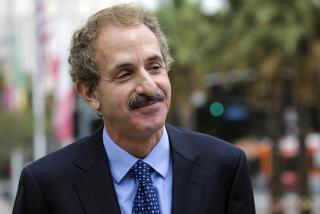Judge Unseals Keating Grand Jury Testimony : Thrifts: Defendants in the securities fraud case claimed it would hurt their chance of a fair trial.
- Share via
A Los Angeles County judge Friday ordered the public release of nearly 4,500 pages of grand jury testimony that led to the state securities fraud indictment of former thrift magnate Charles H. Keating Jr. and three co-defendants.
Superior Court Judge Lance A. Ito rejected a defense request to keep the documents secret. The testimony, transcripts of which will be released next Friday, provides the basis for the 42-count indictment against the former operators of the failed Lincoln Savings & Loan in Irvine.
Stephen C. Neal, Keating’s attorney, said after the hearing that he did not plan to appeal Ito’s ruling. Defense attorneys had argued that release of the transcripts could hurt their clients’ ability to get a fair trial. All the defendants have pleaded not guilty.
Meantime, though, Neal said he would be willing to talk to federal authorities about limited immunity for his client in exchange for Keating’s testimony before the Senate Ethics Committee, which is investigating the conduct of five senators who intervened on Keating’s behalf.
“I certainly would receive or return a phone call” from ethics committee members, Neal said. His comments came in the wake of an article in The Times this week revealing that the committee had considered offering Keating immunity in exchange for testimony against the senators, including Alan Cranston (D-Calif.).
The committee has denied that it ever discussed granting immunity for Keating, an act that would severely damage a federal criminal investigation into one of the nation’s biggest thrift disasters. Lincoln’s collapse in April, 1989, is expected to cost taxpayers more than $2 billion.
In court Friday, defense attorneys argued that the release of grand jury testimony from 94 witnesses would fuel further damaging publicity in the case, provide one-sided stories on the prosecution’s claims and limit the number of potential jurors who have not been influenced by continued news reports.
Lawyers for The Times and the Orange County Register argued that any stories arising out of the release of the transcripts would constitute only an incremental increase in the amount of information on the case.
Ito pointed out that The Times has been putting Lincoln stories in the business section, “which frankly not a lot of people read.” He found that the defense failed to provide enough facts showing that release of the grand jury transcripts would prejudice the defendants’ right to a fair trial.
More to Read
Sign up for Essential California
The most important California stories and recommendations in your inbox every morning.
You may occasionally receive promotional content from the Los Angeles Times.













